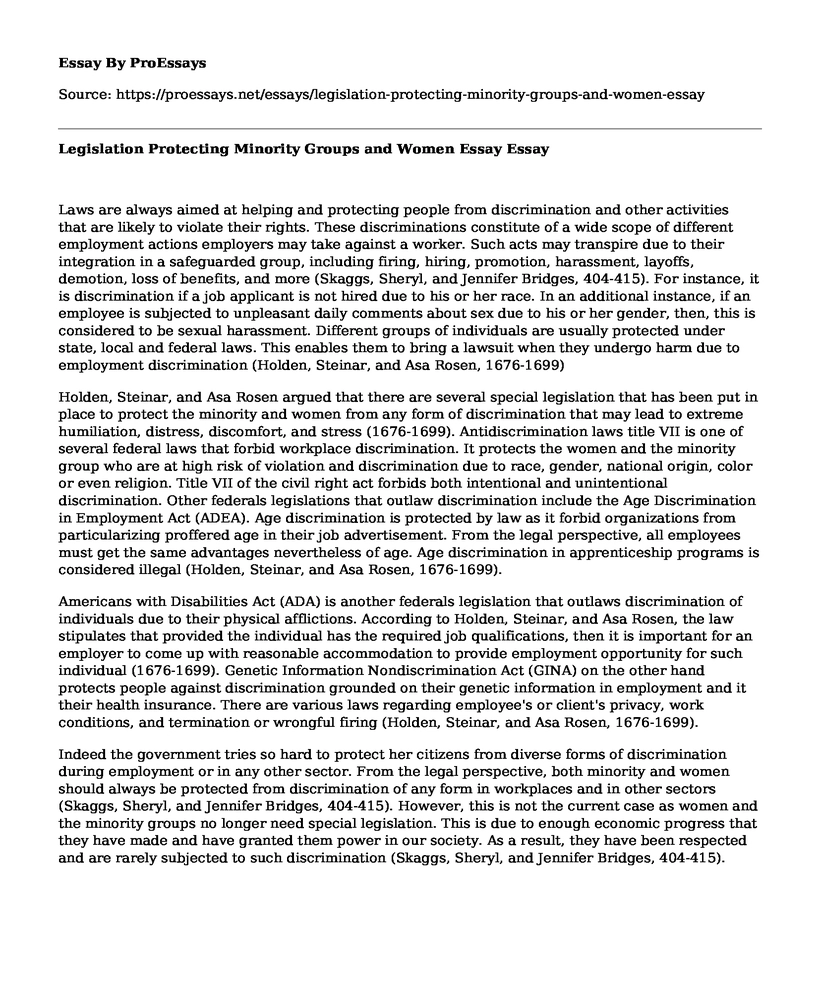Laws are always aimed at helping and protecting people from discrimination and other activities that are likely to violate their rights. These discriminations constitute of a wide scope of different employment actions employers may take against a worker. Such acts may transpire due to their integration in a safeguarded group, including firing, hiring, promotion, harassment, layoffs, demotion, loss of benefits, and more (Skaggs, Sheryl, and Jennifer Bridges, 404-415). For instance, it is discrimination if a job applicant is not hired due to his or her race. In an additional instance, if an employee is subjected to unpleasant daily comments about sex due to his or her gender, then, this is considered to be sexual harassment. Different groups of individuals are usually protected under state, local and federal laws. This enables them to bring a lawsuit when they undergo harm due to employment discrimination (Holden, Steinar, and Asa Rosen, 1676-1699)
Holden, Steinar, and Asa Rosen argued that there are several special legislation that has been put in place to protect the minority and women from any form of discrimination that may lead to extreme humiliation, distress, discomfort, and stress (1676-1699). Antidiscrimination laws title VII is one of several federal laws that forbid workplace discrimination. It protects the women and the minority group who are at high risk of violation and discrimination due to race, gender, national origin, color or even religion. Title VII of the civil right act forbids both intentional and unintentional discrimination. Other federals legislations that outlaw discrimination include the Age Discrimination in Employment Act (ADEA). Age discrimination is protected by law as it forbid organizations from particularizing proffered age in their job advertisement. From the legal perspective, all employees must get the same advantages nevertheless of age. Age discrimination in apprenticeship programs is considered illegal (Holden, Steinar, and Asa Rosen, 1676-1699).
Americans with Disabilities Act (ADA) is another federals legislation that outlaws discrimination of individuals due to their physical afflictions. According to Holden, Steinar, and Asa Rosen, the law stipulates that provided the individual has the required job qualifications, then it is important for an employer to come up with reasonable accommodation to provide employment opportunity for such individual (1676-1699). Genetic Information Nondiscrimination Act (GINA) on the other hand protects people against discrimination grounded on their genetic information in employment and it their health insurance. There are various laws regarding employee's or client's privacy, work conditions, and termination or wrongful firing (Holden, Steinar, and Asa Rosen, 1676-1699).
Indeed the government tries so hard to protect her citizens from diverse forms of discrimination during employment or in any other sector. From the legal perspective, both minority and women should always be protected from discrimination of any form in workplaces and in other sectors (Skaggs, Sheryl, and Jennifer Bridges, 404-415). However, this is not the current case as women and the minority groups no longer need special legislation. This is due to enough economic progress that they have made and have granted them power in our society. As a result, they have been respected and are rarely subjected to such discrimination (Skaggs, Sheryl, and Jennifer Bridges, 404-415).
Conclusion
The government has enormously invested in women's economic empowerment setting straight trails towards eradicating poverty, gender equality, and most importantly promoting inclusive economic growth (Skaggs, Sheryl, and Jennifer Bridges, 404-415). As a result, women have made extensive benefactions to economies, whether on farms, as employees or entrepreneurs, and in businesses (Holden, Steinar, and Asa Rosen, 1676-1699). Regardless of gender discriminations that make the minority end up getting low wage jobs and insecure, they have currently become business owners, shareholders in some of the biggest companies and industries, and potential employers. With so many international commitments underpinning women's and minority's economic empowerment, they have acquired power and ability to blend and thrive in most of our societies. Therefore, they have made enough economic progress that they no longer need special legislation to protect them.
Works cited
Holden, Steinar, and Asa Rosen. "DISCRIMINATION AND EMPLOYMENT PROTECTION". Journal Of The European Economic Association, vol 12, no. 6, 2014, pp. 1676-1699. Oxford University Press (OUP), doi:10.1111/jeea.12097.
Skaggs, Sheryl, and Jennifer Bridges. "Race And Sex Discrimination In The Employment Process". Sociology Compass, vol 7, no. 5, 2013, pp. 404-415. Wiley, doi:10.1111/soc4.12037.
Cite this page
Legislation Protecting Minority Groups and Women Essay. (2022, Sep 11). Retrieved from https://proessays.net/essays/legislation-protecting-minority-groups-and-women-essay
If you are the original author of this essay and no longer wish to have it published on the ProEssays website, please click below to request its removal:
- Fetal Alcohol Abuse Syndrome
- A Review of Who Freed The Slaves? The Fight Over the Thirteenth Amendment
- Essay on Gun Control Argument on Social Media
- Examining Community Perceptions of the Relationships Between Cyber Bullying and Youth Suicide
- Essay Sample on Islam Feminism
- Wage Gap Between Men and Women - Essay Sample
- Paper Example on Politics of Immigration: Debates & Downsides







